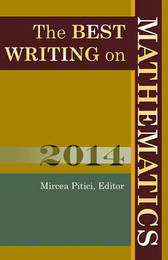
|
The Best Writing on Mathematics 2014
Paperback / softback
Main Details
| Title |
The Best Writing on Mathematics 2014
|
| Authors and Contributors |
Edited by Mircea Pitici
|
| Series | The Best Writing on Mathematics |
|---|
| Physical Properties |
| Format:Paperback / softback | | Pages:360 | | Dimensions(mm): Height 216,Width 140 |
|
| Category/Genre | Mathematics |
|---|
| ISBN/Barcode |
9780691164175
|
| Classifications | Dewey:510 |
|---|
| Audience | | General | | Tertiary Education (US: College) | |
|---|
| Illustrations |
34 color illus. 60 halftones. 30 line illus.
|
|
Publishing Details |
| Publisher |
Princeton University Press
|
| Imprint |
Princeton University Press
|
| Publication Date |
23 November 2014 |
| Publication Country |
United States
|
Description
This annual anthology brings together the year's finest mathematics writing from around the world. Featuring promising new voices alongside some of the foremost names in the field, The Best Writing on Mathematics 2014 makes available to a wide audience many articles not easily found anywhere else--and you don't need to be a mathematician to enjoy them. These writings offer surprising insights into the nature, meaning, and practice of mathematics today. They delve into the history, philosophy, teaching, and everyday occurrences of math, and take readers behind the scenes of today's hottest mathematical debates. Here John Conway presents examples of arithmetical statements that are almost certainly true but likely unprovable; Carlo Sequin explores, compares, and illustrates distinct types of one-sided surfaces known as Klein bottles; Keith Devlin asks what makes a video game good for learning mathematics and shows why many games fall short of that goal; Jordan Ellenberg reports on a recent breakthrough in the study of prime numbers; Stephen Pollard argues that mathematical practice, thinking, and experience transcend the utilitarian value of mathematics; and much, much more. In addition to presenting the year's most memorable writings on mathematics, this must-have anthology includes an introduction by editor Mircea Pitici. This book belongs on the shelf of anyone interested in where math has taken us--and where it is headed.
Author Biography
Mircea Pitici holds a PhD mathematics education from Cornell University, where he teaches math and writing. He has edited The Best Writing on Mathematics since 2010.
Reviews"[The] essays cover a broad swath of mathematics that include entertaining puzzles, complicated proofs, pedagogical philosophy, and technical discussions of mathematical problems. The pedagogical entries are both serious and light... Many of the technical articles are difficult and demand a mathematical background, other entries are well suited for readers more casual readers; the volume is intended to capture both audiences and does it well."--Publishers Weekly "Abundant diversity and some truly exceptional writing make this collection stand out."--Gretchen Kolderup, Library Journal "I would characterize the articles in the book as extreme in terms of several value functions: clarity, lucidity, instructiveness, wittiness, modern day pertinency, broad accessibility... On the whole, the book is informative and thoroughly entertaining."--Alexander Bogomolny, Cut the Knot "Written in a pleasant and alive style, with suggestive quotations and witty comments of the author (also many photos illustrating the text are made by the author), the book will be of great help for students in computer science specializing in computer vision and computer graphics. Other students who use mathematics in their disciplines (physics, chemistry, biology, economics) will find the book as a good source of rapid and reliable information."--Dana Cobza, Studia Mathematica "For those looking to broaden their knowledge of mathematics, including recent mathematical developments, this is a good option and an enjoyable read."--Frannie Worek, Math Teacher "[Pitici's] work fills a gap between expository mathematics and popular explanation. It is a welcome contribution to improving public perception of our discipline."--Phill Schultz, Australian Mathematical Society Gazette
|